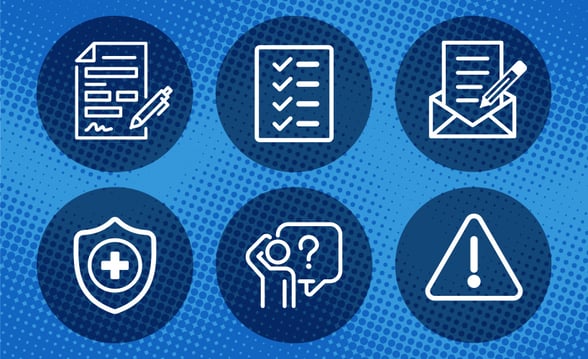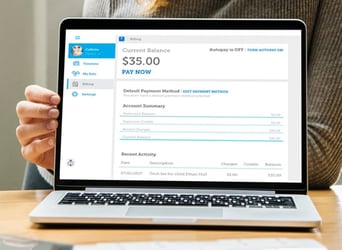Daycare, preschool, and child care are all terms for early education. But understanding the difference between them is just as important.
Finding a child care provider that provides what each family is looking for can be complex. There are different child care services, some more academic and others more social in nature. You might be wondering how the various programs and care options differ, including the services they offer and why they may or may not be regulated.
In this post, we’ll take a look at the practical meaning behind daycare vs. preschool and other child care program terms that you may encounter. We will examine the similarities and differences between daycare and preschool and what you can commonly expect from each type of program.
Child care is vital to society, and the laws must be well regulated. Daycare and preschool programs should also be in line with regulations. State regulators must license both daycare and preschool programs.
Preschools and daycares exist all over the country and have been around for decades. They are privately run by teachers, directors, and other employees in the education field. They offer various services, including meals, snacks, naps, outdoor play, such as garden activities for preschoolers, and learning activities.
All educators and teachers are trained to foster a child’s development. They provide a safe and nurturing environment, allowing your child to reach their full potential by graduating from kindergarten ready for formal schooling.
To help find which child care program is suitable for a family, they often have various names. Child care is the most common term covering most types of child care programs that serve kids before school age. Daycare or “nursery” is commonly used to refer to watching children while parents are at work.
The term preschool usually represents a center that focuses on academics and preparation for grade school. Preschools are best suited for toddlers.
Daycare centers, unlike preschool, are less structured, play-based programs without a set curriculum. Daycares focus on helping children become socialized and learn important interaction developmental skills that will help them in preschool and onward.
What is Daycare?
While daycare is a simple term, it refers to a range of childcare options that help you when you’re at work. Whether you’re looking for a full-time center-based program, a part-time, in-home daycare, or a Waldorf-focused preschool. The options are endless. With multiple options, it can be hard to find care that fits a particular family’s needs. But having that kind of choice is a great benefit to finding a high-quality child care program.
High-Quality Child Care
Good news! No matter what type of child care a family chooses, there’s evidence that high-quality child care helps kids succeed. Studies show children who attend quality daycare, participants were found to exhibit improved behavior, get along with their peers better, and were even stronger readers than other students when they got to grade school. Academic preschools produce strong readers and children who excel in math. And the social interaction children get in a daycare setting may help them become better communicators. Need some ways to further your child care's literacy program? These sight words for preschool have you covered.
What makes a daycare high quality? Well, I’m so glad you asked. At Action Learning Center, our goal is to support the children’s social and emotional development to keep them safe and healthy while helping them reach their intellectual potential. We are also here to provide a nurturing environment that allows children to learn how to get along with other kids and learn the skills necessary for school success.
Typical Age Range of Children in Daycare
The age range for daycare spans infancy (roughly six weeks old) up through school age (roughly five years old). Some daycares may also have programs that extend into the early elementary school years for children who require aftercare.
Daily Activities in Daycare
In daycare, children may engage in a wide range of daily activities, including playtime, arts and crafts, storytime, outdoor play, snacks, naptime, music and movement activities, and socializing with other kids.
Benefits of Daycare
Daycare offers myriad benefits for the children involved. Specifically, being involved in daycare fosters social skills and independence. It supports cognitive development through structured activities, and provides a safe environment for learning while parents are off at work.
What is Preschool?
More to the point: Is daycare and preschool the same? When you first think about preschool, it’s natural to wonder how it’s different from daycare. One of the most significant differences is philosophy: While daycare facilities are centered around care and nurturing, preschools focus on education, provided by trained preschool teachers.
As of 2001, more than half of three and four-year-olds were enrolled in preschool programs to prepare them for entrance into regular classroom settings. Especially with the rise of mothers working out of the home, childcare services have become a huge demand. Parents turn to preschools to give their children a head start academically while also socializing them with other children and keeping them busy.
Often childcare is known by other names like preschool, daycare, and nursery school. However, each of these programs varies widely in setting, format, and educational philosophy. To sum it up, preschool is an educational establishment where children enjoy the day-to-day benefits of learning and playing in a safe, friendly environment for children four to six years of age.
Preschool offers a learning space for childhood education to children before kindergarten. It may be publicly or privately operated and subsidized from public funds.
Educational child care resources
Now more than ever, we want to keep our children actively engaged in positive activities. There are many ways to help them experience beauty and fun and learn new things about our world. The right educational resources are essential for ensuring the highest standards of care for children.
How Preschools are Structured Differently from Daycares
Preschools differ from daycares in some significant ways. For one, preschools focus on structured learning activities to prepare children for kindergarten. They emphasize cognitive and social development, often with a curriculum. Daycares are more focused on care and play, accommodating broader age ranges. There is usually not a formal curriculum involved in daycares, though there can certainly be structured activities.
Curriculum and Learning Outcomes
Preschools offer structured activities to cultivate skills such as reading readiness, math concepts, social skills, and creativity. The ultimate goal is to prepare kids for success in kindergarten and beyond.
Benefits of Preschool
The preschool experience provides a range of benefits to kids. For instance, preschool enhances social skills, fosters independence, and promotes cognitive development through structured learning activities. The goal is to lay a foundation for lifelong learning and academic success.
Daycare vs Preschool: The Key Differences
Preschool and daycare are often confused among parents, but they have very different meanings. The biggest difference between the two is the age differences that attend both programs. Daycare programs range from six weeks and older, while preschool is for children from 2 through 5 years of age.
Preschool is typically in place to teach children pre-academic skills to prepare them for grade school. Daycare, focusing on younger children, will center on social skills.
Child care is a big decision, and parents always have questions about the differences between preschool and daycare. But there is one thing that both preschools and daycare facilities have in common–they are all licensed through the state. That being said, the pressure of finding the right program can be less daunting knowing that legitimate facilities are licensed. All childcare programs have their ups and downs, no days are ever smooth sailing when children are involved. That’s why it’s great that both daycare and preschool’s staff has to be trained and meet qualifications for every situation. Now, let’s focus on the differences between preschool vs daycare.
Age Difference
A difference between daycare and preschool is the age. Daycare is generally for infants and toddlers although some may offer after school programs for older kids. Daycare is suited for infants and toddlers, although some may offer after school programs for older kids. In a nutshell, daycare is a place where your children can play while you work. Naturally, the best daycares aren’t free and they admit limited numbers of children at a time.
There are several benefits to full-time daycare services. This can include more socialization, learning how to interact with each other and play well with others, and an overall education being provided by the staff.
The youngest students at most preschools are five years old, with some preschools accepting children as young as three. The curriculum stresses school readiness and social skills. Preschool focuses on getting the children ready for kindergarten and preparing them for a classroom setting.
Schedule
A quality daycare center should offer both full and part time options. You don’t have to worry about dropping your child off as early or late as they will be safe and secure while you are at work. The daycare's operating hours should reflect that.
A significant difference is that most preschools don’t have as flexible hours like daycare. Many preschools have schedules that are seasonal, with time off for educators, holidays, and breaks. This can significantly affect working parents who rely on child care year-round. But get them in the habit of working around a traditional school schedule.
Working parents almost always need year-round care. Some elementary schools start with preschools that offer child care before and after school hours.
Caregiver Staff
The biggest factor you should consider is the child to teacher ratio and this varies across the nation. Many parents are searching for a preschool that offers small class sizes and more individualized attention. Smaller class sizes means each child receives more attention and develops the confidence they need to progress and excel. Of course, this entails a sizable, committed preschool staff.
By law, child care ratios vary based on a child’s age. For infants in a daycare center, the ratios range from 1:3 to 1:5, depending on your state and the number of children at the facility.
As your child gets older, the ratio of care providers to children will change, and the state laws generally permit a 1:12 child care ratio for ages 3-5, though some child care centers will operate with a lower ratio to provide children more personalized attention.
Children are in a mixed-age environment in a family or in-home style daycare and that will change the ratio. In-home daycare centers provide the flexibility of a private childcare environment. They are best for part-time and temporary care. An in-home caregiver watches up to ten children at a time, usually with a wider age range and no more than two infants.
Potty Breaks
Both in-home and childcare centers require a child to be potty trained once they are 3. This is a common rule for childcare facilities everywhere.
Realistically, a child won’t be potty trained by a certain date. Although you may have set expectations for your child’s milestone, it is typically developmentally inappropriate to do so. As a result of child care regulations, many facilities do not have changing stations. If a child is still in diapers, it may take some extra planning on the parent(s) part. And since most preschools’ ratio is low, staff cannot provide the one-on-one attention each child needs. Since daycare typically serves children ages 0-3, daycare staff are expected to change diapers.
With the changing demands of potty training, many preschools simply cannot accommodate child diapers. Therefore, if you have a child who is hesitant to use the potty, consider this point when making your preschool selection decision.
Operational Hours
Typical daycare operational hours are from early morning to late afternoon, accommodating working parents' schedules to ensure kids are cared for throughout the day. Preschool operational hours are usually aligned with typical elementary school hours, running from morning to early or mid afternoon.
Staff Qualifications
While adequate training is needed in both environments, preschools usually call for a higher level of expertise in early childhood development and pedagogy.
Choosing the Right Option for Your Child
As you consider which option is right for your child and your family, there are multiple factors to keep in mind.
Factors to Consider
- Curriculum and educational focus
- Hours of operation (particularly aftercare needs)
- Age range
- Teacher training and qualifications
- Cost
Questions to Ask When Visiting Facilities
When touring preschool or daycare facilities, asking the right questions is critical.
- What are the qualifications and experience of the teachers and caregivers?
- What type of curriculum or activities are offered, and how are they structured?
- What measures are in place to ensure the safety and security of the children?
- What does a typical day look like? How are activities, meals, naps, and playtime scheduled?
- How is communication between staff and parents facilitated? Are there regular updates or meetings? What about an email list?
Get 100+ Editable and Printable Templates for Almost Every Preschool Situation
We know preschools like yours are busy. That's why we made dozens of templates to help you manage the various aspects of your organization. With billing and invoicing, activity templates, forms, and even marketing materials, we have it all. Download all 100 today!
FAQs
How does Vanco's payment solution integrate with existing child care management software?
Our payment solutions are designed to be easily integrated with a wide range of child care management solutions, and our team is here to help you with the transition.
Are there options for recurring payments to automate the billing process for regular child care fees?
Yes, our software accommodates a range of payment options, including recurring drafts to handle ongoing child care fees.
How can Vanco's payment solutions help improve the enrollment process for new families?
Vanco's payment solutions offer online registration and payments, a high level of convenience and accessibility, automated recurring payments, and more.
What types of payment methods are accepted through Vanco's system (e.g., credit cards, direct bank transfers, online payments)?
We offer a wide range of payment options, including credit and debit cards, bank drafts, and online payment platforms.
How does the payment system handle late payments or payment failures?
You can customize the payment system to automatically assess fees and to handle payment failures in a way that aligns with your school or daycare policies.











